Vitamin B7, also known as biotin, is a water-soluble vitamin that keeps your hair shiny, skin glowing, and nails strong while supporting your metabolism and brain function. This guide is perfect for anyone dealing with brittle nails, thinning hair, or low energy levels, as well as those curious about adding biotin to their wellness routine.
We’ll explore how biotin transforms your hair, skin, and nails from the inside out, plus how it boosts your energy and sharpens mental clarity. You’ll also learn to spot the warning signs of biotin deficiency and discover the best food sources and supplements to meet your daily needs safely.
Understanding Biotin’s Essential Role in Your Body
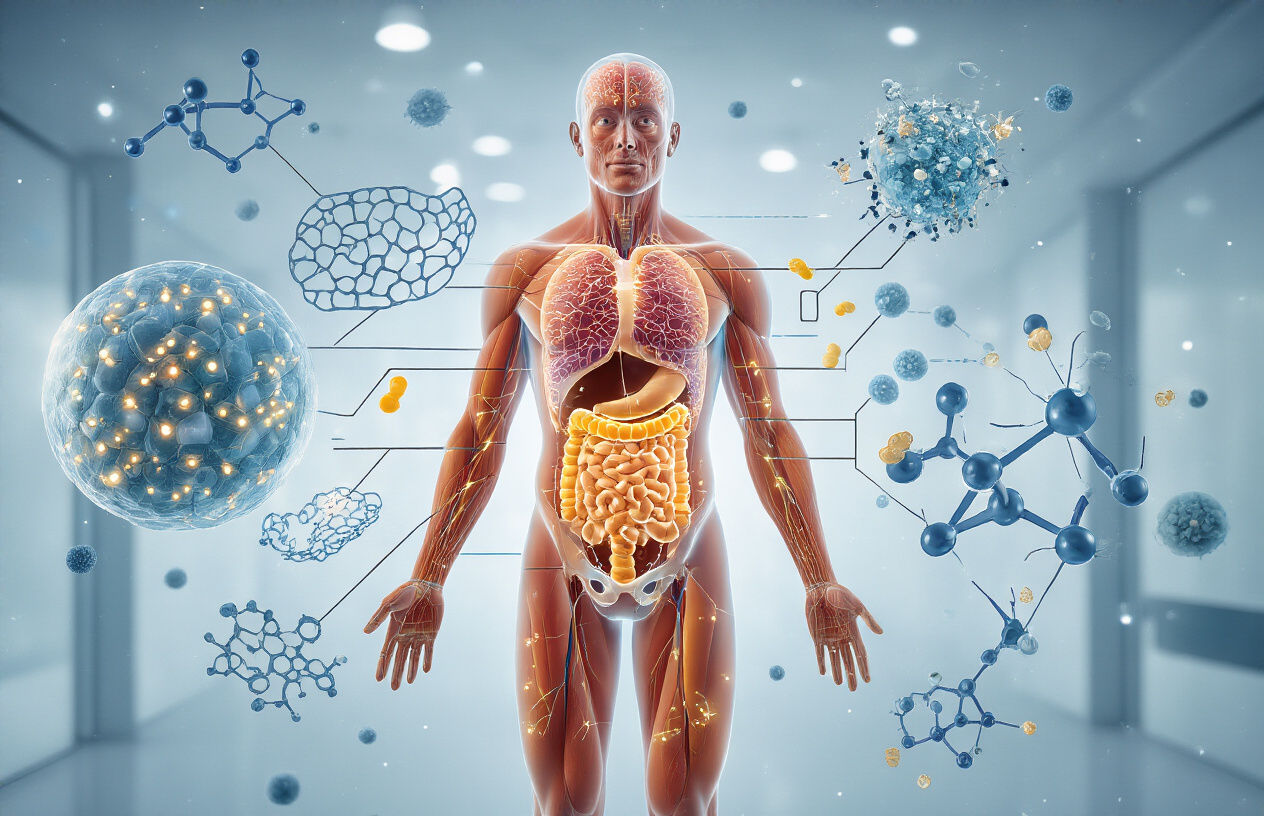
How Biotin Powers Your Metabolism
Biotin acts as your body’s metabolic powerhouse, working behind the scenes to convert the food you eat into usable energy. This water-soluble vitamin serves as a coenzyme for four critical carboxylase enzymes that break down carbohydrates, fats, and proteins. When you consume a meal, biotin jumps into action, helping transform glucose from carbohydrates into ATP – the cellular currency your body uses for energy.
The vitamin plays a particularly important role in gluconeogenesis, the process where your body creates glucose from non-carbohydrate sources like amino acids and fatty acids. This becomes especially crucial during periods of fasting or intense physical activity when your glucose stores run low. Biotin also supports fatty acid synthesis, helping your body create the essential fats needed for hormone production, brain function, and cellular membrane integrity.
Without adequate biotin, your metabolic machinery begins to slow down, leading to fatigue, muscle weakness, and difficulty maintaining stable blood sugar levels. The vitamin works closely with other B vitamins to ensure your metabolic pathways run smoothly and efficiently.
Key Enzymatic Functions That Keep You Healthy
Biotin serves as an essential cofactor for four specific carboxylase enzymes that control fundamental biological processes:
Acetyl-CoA Carboxylase (ACC)
- Initiates fatty acid synthesis
- Regulates cholesterol production
- Controls lipid metabolism
Pyruvate Carboxylase
- Converts pyruvate to oxaloacetate
- Supports glucose production during fasting
- Maintains blood sugar stability
3-Methylcrotonyl-CoA Carboxylase
- Breaks down leucine (essential amino acid)
- Prevents toxic metabolite accumulation
- Supports protein metabolism
Propionyl-CoA Carboxylase
- Processes odd-chain fatty acids
- Metabolizes certain amino acids
- Converts propionate to useful compounds
These enzymes work together to maintain your body’s metabolic balance. They ensure proper energy production, support cellular growth and repair, and help eliminate potentially harmful metabolic waste products. When biotin levels drop, these enzymatic functions become compromised, leading to a cascade of metabolic disruptions that can affect everything from your energy levels to your skin health.
Why Your Body Cannot Produce Enough Biotin Naturally
Your body faces a constant biotin shortage because it cannot manufacture this essential vitamin in sufficient quantities. While beneficial bacteria in your intestinal tract do produce some biotin, the amount varies greatly between individuals and often falls short of your daily needs.
Several factors limit your body’s biotin production:
- Gut bacteria variability: Not everyone has optimal levels of biotin-producing bacteria
- Antibiotic use: These medications can wipe out beneficial bacteria that create biotin
- Digestive disorders: Conditions like Crohn’s disease or celiac disease impair bacterial biotin synthesis
- Age-related changes: Gut bacteria composition shifts as you get older, often reducing biotin production
The biotin your gut bacteria do produce gets absorbed in your colon, but this process isn’t always efficient. Raw egg whites contain avidin, a protein that binds to biotin and prevents its absorption, which can create deficiencies in people who consume large amounts of raw eggs.
Your body also cannot store biotin for extended periods since it’s water-soluble and gets excreted in urine relatively quickly. This means you need a consistent daily supply from food sources or supplements to maintain optimal levels and support all the critical metabolic functions that depend on this vital nutrient.
Transform Your Hair, Skin, and Nails with Biotin
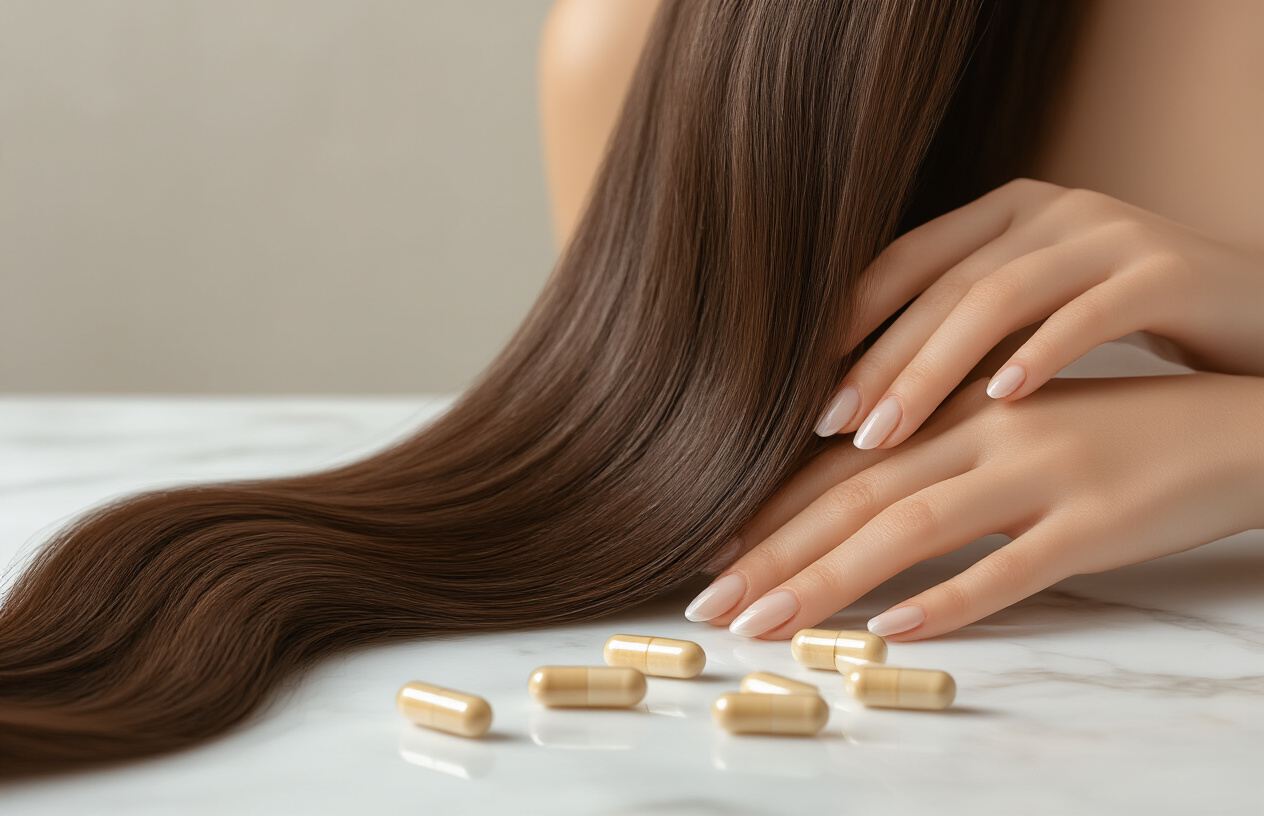
Strengthen Brittle Nails and Promote Faster Growth
Biotin plays a crucial role in keratin production, the protein that forms the structural foundation of your nails. When your body has adequate biotin levels, your nails become noticeably stronger and less prone to breaking, splitting, or peeling. Research shows that people with brittle nails who take biotin supplements often see significant improvements in nail thickness and overall quality within 6-9 months.
The B-vitamin helps your body produce amino acids that build keratin more effectively. This process directly translates to nails that grow faster and maintain their strength as they lengthen. Many people notice their nails becoming less flexible in a good way – they bend without breaking and maintain their shape better during daily activities.
If you’re dealing with nails that constantly chip or break at inconvenient moments, biotin deficiency might be the culprit. Your nails often serve as visible indicators of your nutritional status, and weak, slow-growing nails frequently signal inadequate biotin intake.
Achieve Thicker, More Lustrous Hair
Hair follicles depend heavily on biotin to produce strong, healthy strands. This vitamin supports the creation of keratin in your hair shaft, making each strand more resilient and giving your overall hair a fuller appearance. People often report that their hair feels thicker and looks shinier after maintaining consistent biotin levels.
Biotin deficiency commonly manifests as hair thinning, particularly around the hairline and crown. Your hair might feel fine and fragile, breaking easily when you brush or style it. The vitamin helps strengthen the hair from the root, supporting follicle health and encouraging robust growth patterns.
Color-treated or chemically processed hair benefits especially from adequate biotin intake. The vitamin helps repair damage and maintains hair elasticity, reducing breakage and improving texture. Your hair’s natural oils distribute more evenly when biotin levels are optimal, creating that coveted healthy shine without heavy styling products.
Maintain Youthful, Glowing Skin
Your skin cells regenerate constantly, and biotin plays a vital role in this renewal process. The vitamin helps your body metabolize fats that contribute to healthy cell membranes, keeping your skin supple and well-hydrated from within. This process supports your skin’s natural barrier function, helping it retain moisture and protect against environmental stressors.
Biotin supports the production of fatty acids that keep your skin looking plump and smooth. These compounds help maintain skin elasticity and reduce the appearance of fine lines. Your complexion often appears more even and radiant when biotin levels are adequate because the vitamin supports healthy cell turnover.
Many people notice improvements in skin texture and appearance when they address biotin deficiency. Dry, flaky patches often clear up, and the skin develops a more consistent, healthy glow. The vitamin also supports your skin’s ability to heal minor irritations and maintain its protective barrier.
Combat Common Beauty Problems with Adequate Biotin
Several beauty concerns can trace their roots back to insufficient biotin intake. Dermatitis around the eyes, nose, and mouth often indicates biotin deficiency, appearing as red, scaly patches that can be both uncomfortable and cosmetically concerning. These skin issues typically improve once biotin levels normalize.
Hair loss patterns, particularly diffuse thinning rather than male-pattern baldness, frequently respond well to biotin supplementation. The vitamin addresses the nutritional component of hair loss, though results take time – typically 3-6 months of consistent intake before you see noticeable improvements.
Nail problems beyond simple brittleness also connect to biotin status. Horizontal ridges, white spots, and nails that separate from the nail bed can all indicate inadequate biotin levels. These issues often resolve gradually as biotin intake improves and new, healthier nail tissue grows.
| Beauty Concern | Biotin’s Role | Expected Timeline |
|---|---|---|
| Brittle nails | Strengthens keratin production | 6-9 months |
| Hair thinning | Supports follicle health | 3-6 months |
| Dry, flaky skin | Improves cell membrane health | 4-8 weeks |
| Facial dermatitis | Reduces inflammatory response | 6-12 weeks |
Boost Your Energy and Brain Function
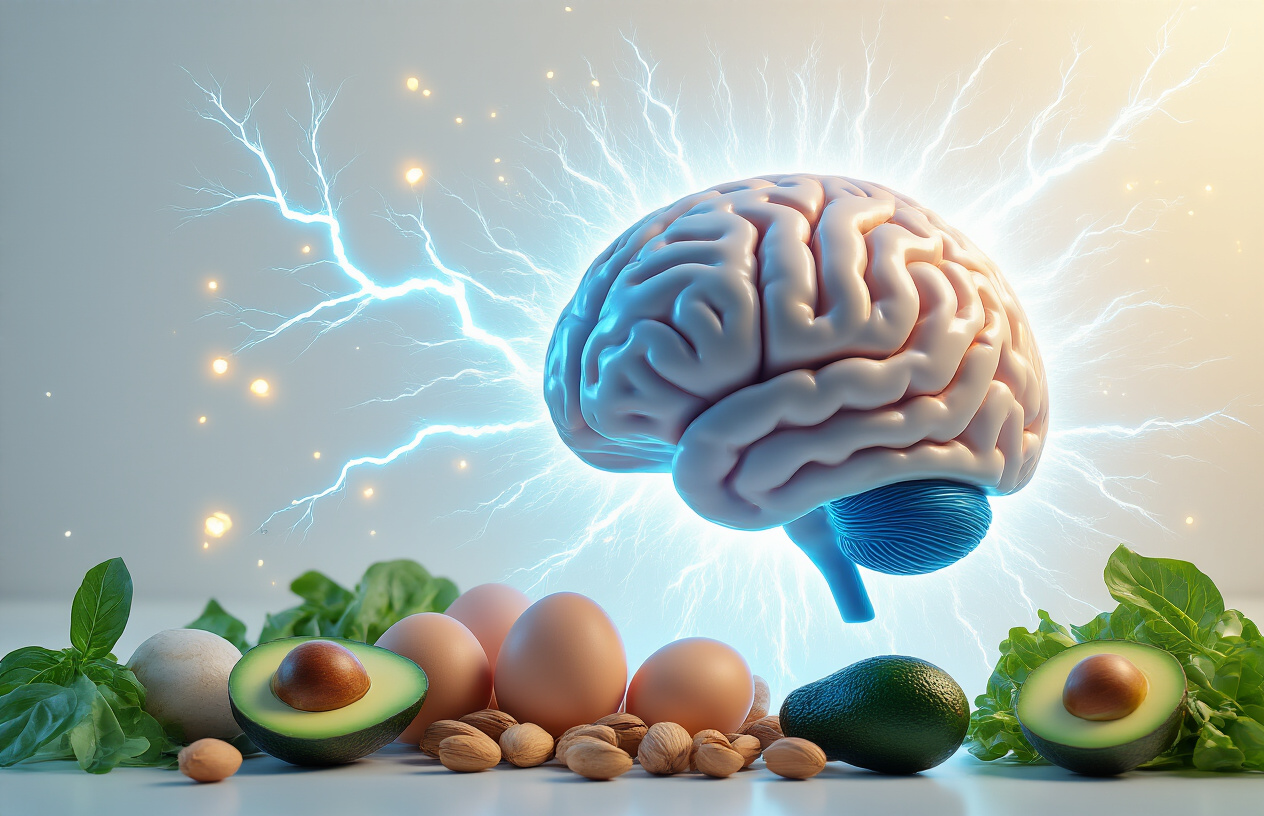
Convert Food into Usable Energy More Efficiently
Biotin acts like a master key that unlocks your body’s energy production system. This vitamin plays a critical role in breaking down macronutrients – carbohydrates, fats, and proteins – into energy your cells can actually use. When you eat a meal, biotin helps activate specific enzymes called carboxylases that are essential for metabolizing these nutrients.
The process works like this: biotin-dependent enzymes help convert glucose from carbohydrates into energy, break down fatty acids for fuel, and process amino acids from proteins. Without adequate biotin, these metabolic pathways slow down significantly, leaving you feeling sluggish and tired even after eating nutritious meals.
Your muscles, brain, and organs all depend on this efficient energy conversion. When biotin levels are optimal, your body can quickly access stored energy reserves and convert incoming nutrients into immediate fuel. This explains why people with biotin deficiency often experience persistent fatigue and muscle weakness.
Athletes and active individuals particularly benefit from biotin’s energy-boosting properties. The vitamin supports the breakdown of stored glycogen in muscles and helps maintain steady blood sugar levels during physical activity. This leads to improved endurance and faster recovery times after workouts.
Enhance Mental Clarity and Cognitive Performance
Your brain consumes about 20% of your body’s total energy, making efficient nutrient metabolism crucial for mental performance. Biotin directly supports brain function by ensuring neurons receive steady energy supplies and helping produce neurotransmitters that control mood, focus, and memory.
The vitamin plays a key role in synthesizing acetylcholine, a neurotransmitter essential for learning and memory formation. Higher biotin levels have been linked to improved concentration, sharper thinking, and better information processing speed. Many people notice clearer thinking and reduced brain fog when their biotin status improves.
Research shows biotin also supports the production of myelin, the protective coating around nerve fibers that speeds up electrical signals in the brain. This myelin maintenance is crucial for maintaining cognitive sharpness as you age and protecting against neurodegenerative conditions.
Students, professionals, and anyone requiring sustained mental focus can benefit from adequate biotin intake. The vitamin helps stabilize mood by supporting the production of serotonin and dopamine, neurotransmitters that regulate emotional well-being and motivation.
Support Healthy Nervous System Function
Biotin serves as a fundamental building block for maintaining your entire nervous system. The vitamin helps produce and maintain the myelin sheath that surrounds nerve fibers throughout your body, from your brain down to your fingertips and toes.
This myelin protection is essential for proper nerve signal transmission. When biotin levels drop, nerve communication can become slower and less reliable, leading to symptoms like tingling, numbness, or muscle coordination problems. The vitamin also supports the health of nerve cell membranes, keeping them flexible and responsive.
Your peripheral nervous system – the network of nerves outside your brain and spinal cord – depends heavily on biotin for maintenance and repair. This includes the nerves that control muscle movement, sensation, and autonomic functions like heart rate and digestion.
Biotin deficiency can manifest as neurological symptoms before other signs appear. Early warning signs include muscle cramps, nerve pain, difficulty with coordination, and unusual sensations in hands and feet. People with diabetes or those taking certain medications may be at higher risk for biotin depletion and related nerve problems.
The vitamin works synergistically with other B vitamins to maintain nervous system health, creating a protective network that supports both immediate nerve function and long-term neurological wellness.
Recognize and Address Biotin Deficiency
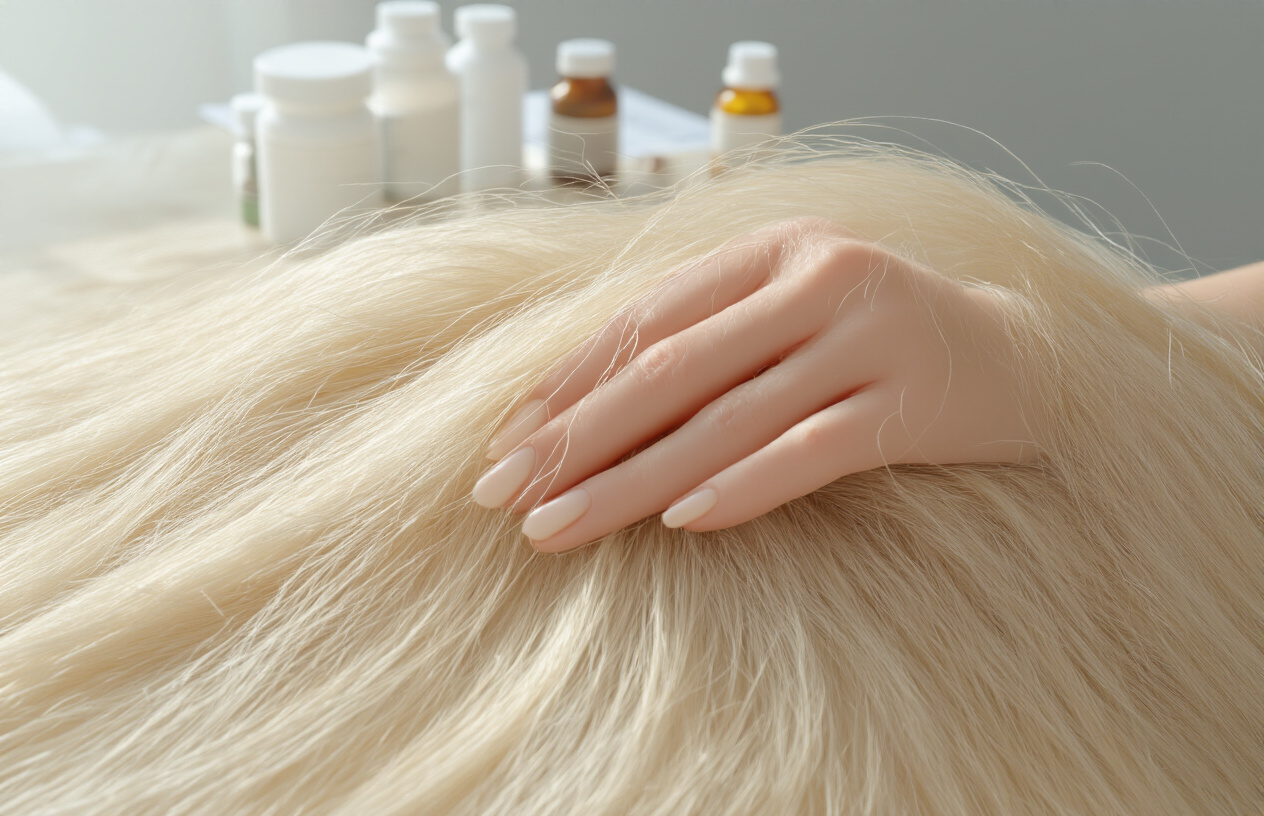
Identify Warning Signs Before They Worsen
Your body sends clear signals when biotin levels drop dangerously low. Hair thinning or unusual hair loss often appears first, followed by brittle nails that crack and split easily. Skin problems develop next – you might notice a scaly, red rash around your eyes, nose, or mouth that won’t go away with regular skincare.
Mental symptoms deserve immediate attention. Brain fog, depression, and unusual fatigue can indicate severe biotin deficiency. Some people experience muscle pain, tingling in their hands and feet, or difficulty concentrating on simple tasks. These neurological symptoms worsen quickly without treatment.
Digestive issues accompany many cases of biotin deficiency. Nausea, loss of appetite, and stomach discomfort become persistent problems. Children with deficiency may show delayed development, seizures, or difficulty meeting developmental milestones.
Understand Who Is Most at Risk
Pregnant women face the highest risk of biotin deficiency. Growing babies require significant biotin for proper development, depleting maternal stores rapidly. Nearly half of pregnant women show some degree of biotin deficiency during their pregnancy.
People taking certain medications need extra vigilance. Long-term antibiotic use destroys beneficial gut bacteria that produce biotin naturally. Anti-seizure medications like carbamazepine and phenytoin interfere with biotin absorption and metabolism.
Genetic disorders create lifelong biotin challenges. Biotinidase deficiency affects about 1 in 60,000 newborns, preventing proper biotin recycling in the body. People with this condition require lifelong biotin supplementation to avoid serious complications.
Alcoholics and people with digestive disorders absorb biotin poorly. Inflammatory bowel disease, Crohn’s disease, and celiac disease damage intestinal lining where biotin absorption occurs. Raw egg white consumption blocks biotin absorption through avidin binding.
Prevent Long-term Health Complications
Untreated biotin deficiency causes irreversible damage to your nervous system. Severe cases lead to permanent hearing loss, vision problems, and cognitive impairment. The myelin sheaths protecting nerve fibers deteriorate without adequate biotin, creating lasting neurological damage.
Developmental delays in children become permanent without early intervention. Biotin deficiency during critical growth periods affects brain development, causing intellectual disabilities and seizure disorders that persist into adulthood. Early detection and treatment prevent these devastating outcomes.
Immune system function weakens significantly with prolonged deficiency. Your body loses its ability to fight infections effectively, leading to frequent illnesses and slower healing. Severe deficiency increases susceptibility to fungal infections and other opportunistic diseases.
Heart problems develop gradually as biotin deficiency affects cardiac muscle function. Some people experience irregular heartbeats or enlarged heart chambers. These cardiovascular complications can become life-threatening without proper biotin restoration.
Regular monitoring prevents these serious complications. Blood tests measure biotin levels accurately, though most doctors diagnose deficiency based on symptoms and risk factors. Early treatment with biotin supplements reverses most symptoms within weeks, but prevention through adequate intake remains the best strategy.
Get Optimal Biotin from Food Sources
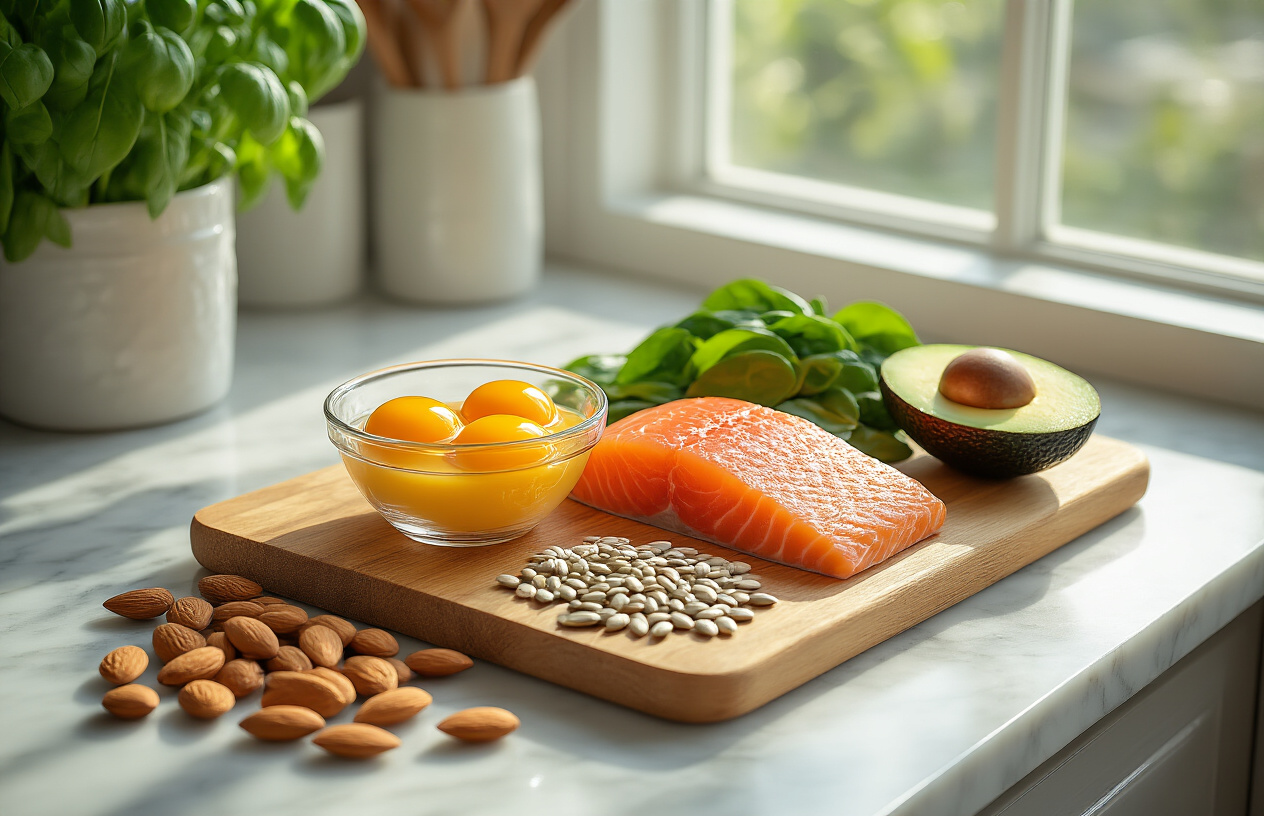
Top Biotin-Rich Foods to Include Daily
Organ meats top the list of biotin powerhouses, with beef liver containing approximately 30 micrograms per 3-ounce serving. If organ meats aren’t your thing, egg yolks pack a solid punch with about 10 micrograms per yolk. The key is eating the whole egg since biotin concentrates in the yolk.
Nuts and seeds make excellent daily additions. Almonds, peanuts, and sunflower seeds deliver both biotin and healthy fats. A quarter cup of sunflower seeds provides roughly 2.6 micrograms. Sweet potatoes deserve a spot on your plate too – one medium baked sweet potato contains about 2.4 micrograms while offering fiber and beta-carotene.
| Food Source | Biotin Content | Serving Size |
|---|---|---|
| Beef Liver | 30 mcg | 3 oz |
| Egg Yolk | 10 mcg | 1 large egg |
| Sunflower Seeds | 2.6 mcg | 1/4 cup |
| Sweet Potato | 2.4 mcg | 1 medium |
| Salmon | 5 mcg | 3 oz |
| Avocado | 2-6 mcg | 1 medium |
Fatty fish like salmon and sardines contribute around 5 micrograms per serving while supporting overall health. Avocados bring versatility to your meals with 2-6 micrograms each, depending on size. Mushrooms, particularly portobello and shiitake varieties, add earthy flavors plus biotin to any dish.
Plan Balanced Meals for Maximum Absorption
Creating biotin-rich meal plans means thinking beyond single foods. Start your day with scrambled eggs cooked in a small amount of healthy oil, paired with sliced avocado on whole grain toast. This combination delivers multiple biotin sources while supporting overall nutrition.
Lunch becomes more exciting with a salmon and sweet potato bowl. Roast sweet potato cubes with olive oil and seasonings, then top with grilled salmon, mixed greens, and sliced almonds. The healthy fats help with nutrient absorption while providing sustained energy.
Sample Daily Meal Plan:
- Breakfast: 2-egg omelet with mushrooms + 1/2 avocado
- Lunch: Salmon and roasted sweet potato salad with sunflower seeds
- Dinner: Lean beef stir-fry with mixed vegetables
- Snacks: Handful of almonds or peanuts
Dinner options can include lean cuts of beef or pork paired with roasted vegetables. Even small amounts of organ meat mixed into ground beef for burgers or meatballs boost biotin content significantly.
Planning ahead helps ensure consistent intake. Prep hard-boiled eggs for quick snacks, batch-cook sweet potatoes for the week, and keep nuts portioned for grab-and-go options.
Combine Foods for Enhanced Biotin Benefits
Smart food pairing amplifies biotin absorption and utilization. Combining biotin-rich foods with healthy fats improves uptake since biotin works closely with fat metabolism. Drizzle olive oil over your sweet potato, eat nuts with your eggs, or add avocado slices to salmon dishes.
Vitamin C partners well with biotin for cellular health. Pair your biotin sources with citrus fruits, berries, or bell peppers. A spinach salad with sliced strawberries, almonds, and grilled chicken creates a nutrient-dense combination.
B-vitamin complex foods work synergistically with biotin. Whole grains, leafy greens, and legumes provide other B vitamins that support biotin’s functions in energy metabolism and cellular processes.
Powerful Food Combinations:
- Eggs + spinach + whole grain toast
- Salmon + avocado + sweet potato
- Almonds + berries + yogurt
- Beef liver + sautéed onions + brown rice
Magnesium-rich foods like dark chocolate, pumpkin seeds, and leafy greens support the enzymes that help biotin do its job. Adding a small square of dark chocolate to your almond snack isn’t just delicious – it’s strategic.
Avoid Foods That Block Biotin Absorption
Raw egg whites contain avidin, a protein that binds to biotin and prevents absorption. Cooking denatures avidin, so cooked eggs are fine, but avoid consuming large quantities of raw egg whites found in some smoothie recipes or protein drinks.
Alcohol interferes with biotin absorption and increases excretion through urine. While moderate consumption might not cause deficiency, regular heavy drinking can impact biotin status over time.
Certain medications affect biotin levels. Anti-seizure drugs, antibiotics, and some acne medications can reduce biotin absorption or increase its breakdown. If you take these medications regularly, focus extra attention on biotin-rich foods.
Foods and Substances to Limit:
- Raw egg whites in large quantities
- Excessive alcohol consumption
- Highly processed foods with minimal nutrients
- Foods high in refined sugars
Smoking damages the digestive system and reduces nutrient absorption overall, including biotin. The chemicals in cigarettes also increase oxidative stress, which may increase biotin needs.
Highly processed foods don’t directly block absorption, but they crowd out nutrient-dense options. Chips, candy, and sugary drinks provide empty calories without supporting your biotin goals. Choose whole foods whenever possible to maximize your nutrient density and give your body the tools it needs for optimal biotin utilization.
Choose the Right Biotin Supplements
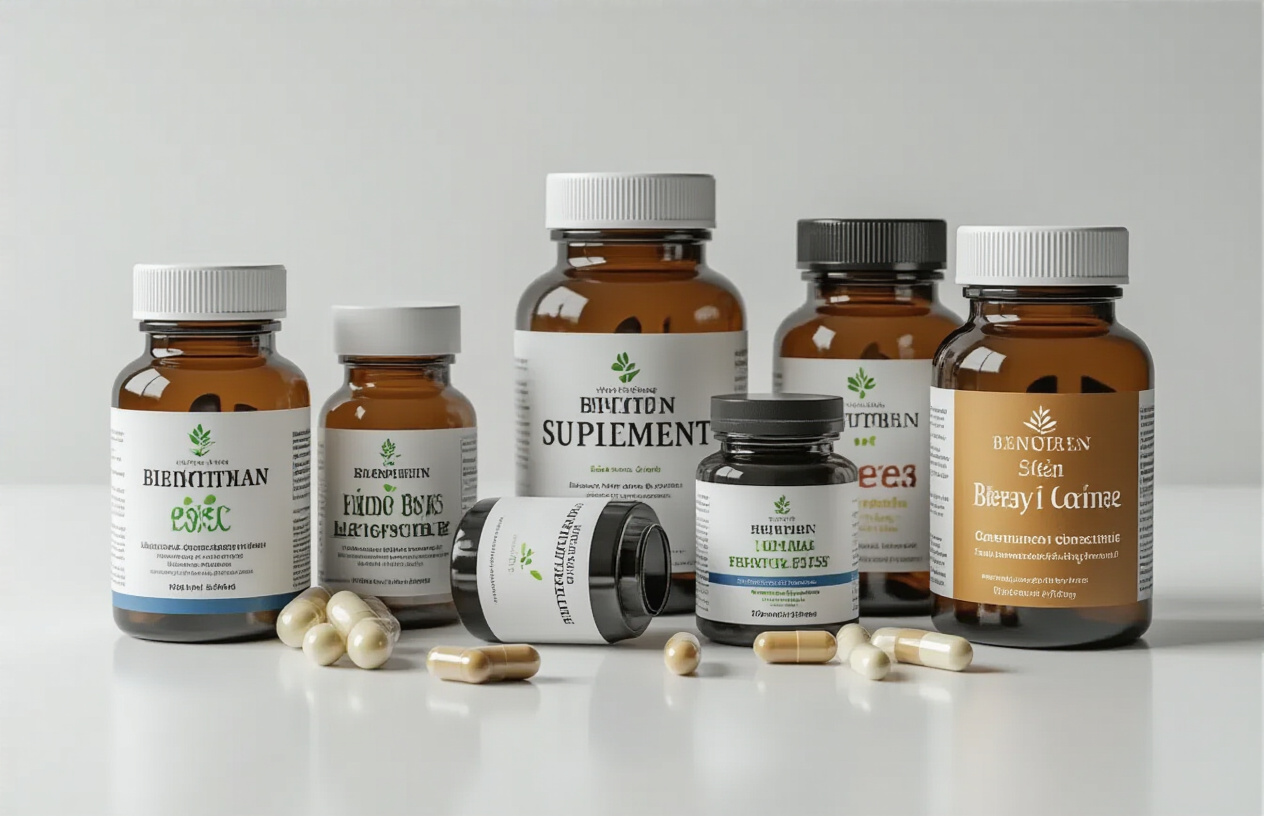
Determine Your Ideal Daily Dosage
Most adults need between 30 to 100 micrograms of biotin daily for basic health maintenance. However, therapeutic doses can range from 2,500 to 10,000 micrograms for specific conditions like brittle nails or hair loss. Start with lower doses and gradually increase based on your body’s response.
Your individual needs depend on several factors. Pregnant and breastfeeding women require higher amounts – typically 35 micrograms during pregnancy and 30-35 micrograms while nursing. People with certain genetic conditions affecting biotin metabolism may need significantly higher doses under medical supervision.
Age also plays a role in dosing requirements:
- Children (1-3 years): 8 micrograms
- Children (4-8 years): 12 micrograms
- Teens (9-18 years): 20-25 micrograms
- Adults (19+ years): 30 micrograms
- Therapeutic doses: 2,500-10,000 micrograms
Select High-Quality Supplement Forms
Biotin supplements come in various forms, each with distinct advantages. Capsules offer precise dosing and longer shelf life, while tablets provide convenience and often cost less. Liquid forms absorb faster but may have shorter expiration dates.
Look for these quality indicators when shopping:
- Third-party testing certificates on the label
- USP verification or similar quality seals
- Minimal fillers and artificial additives
- Clear potency labeling in micrograms (mcg)
- Proper storage requirements listed
Gummy vitamins taste great but often contain added sugars and may have lower biotin concentrations. Sublingual tablets dissolve under your tongue for potentially faster absorption, though standard oral supplements work just as well for most people.
Time Your Supplements for Best Results
Take biotin supplements on an empty stomach for optimal absorption, preferably 30 minutes before eating. Your body absorbs water-soluble vitamins like biotin best when your digestive system isn’t processing other nutrients simultaneously.
Morning timing works best since biotin can boost energy levels. Taking it late in the evening might interfere with sleep for some sensitive individuals. Split larger doses throughout the day if you’re taking therapeutic amounts above 2,500 micrograms.
Consistency matters more than perfect timing. Pick a routine you can stick with daily – whether that’s with your morning coffee or right after brushing your teeth. Set phone reminders during your first few weeks until the habit becomes automatic.
Avoid Dangerous Interactions with Other Medications
Biotin can interfere with several laboratory tests, potentially leading to false results. Stop taking biotin supplements at least 72 hours before blood work, especially tests for thyroid function, cardiac markers, or vitamin D levels. Always inform healthcare providers about your biotin supplementation.
Certain medications affect biotin absorption or effectiveness:
| Medication Type | Interaction | Recommendation |
|---|---|---|
| Anticonvulsants | Reduce biotin levels | Take supplements 2+ hours apart |
| Antibiotics | Decrease gut bacteria that produce biotin | Consider probiotics during treatment |
| Raw egg whites | Contain avidin that binds biotin | Avoid consuming together |
| Alcohol | Impairs biotin absorption | Separate by several hours |
Biotin doesn’t typically interact dangerously with other vitamins, but high doses might affect how your body processes other B-vitamins. Stick to recommended dosages unless working with a healthcare provider who understands your complete supplement regimen and medical history.
Maximize Biotin Benefits Safely
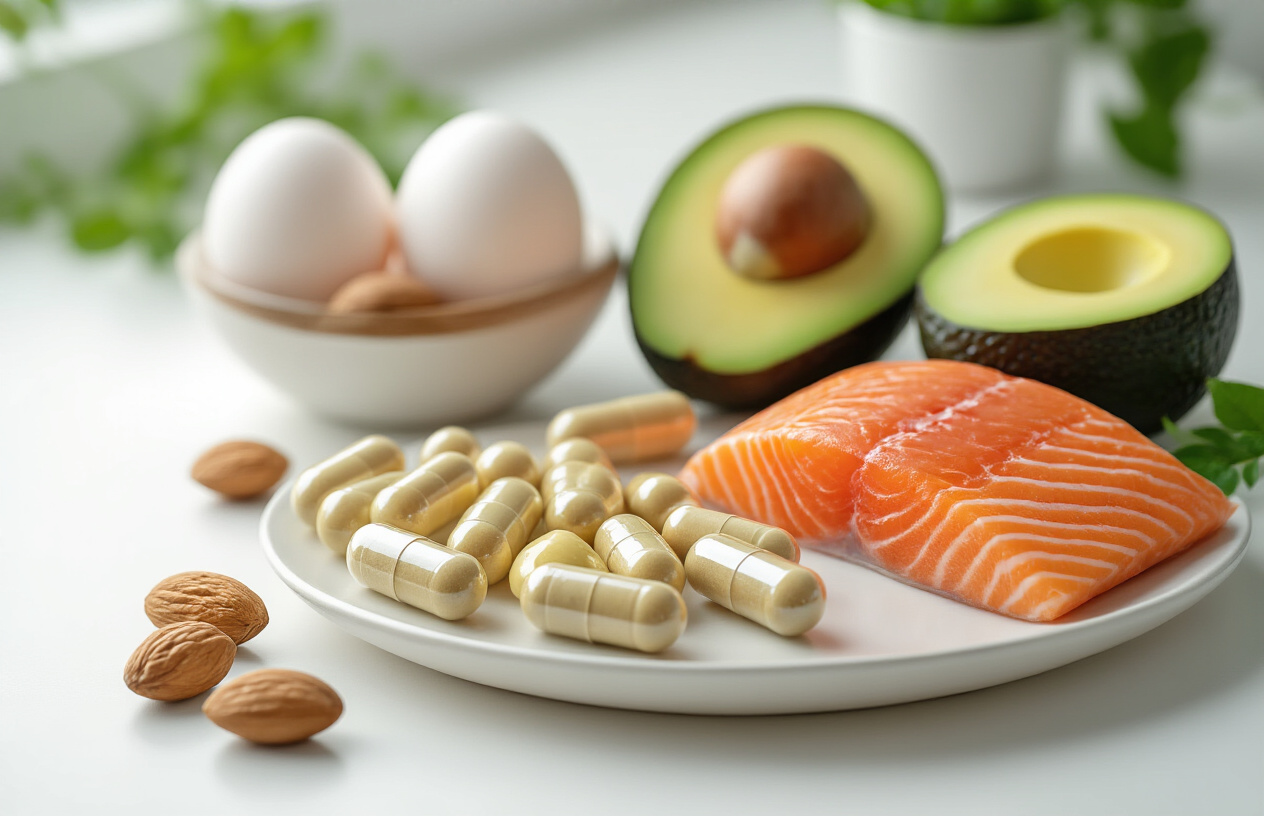
Follow Proper Dosing Guidelines
Most healthy adults only need about 30 micrograms of biotin daily, which sounds tiny but meets your body’s requirements perfectly. The good news? You’re probably already getting enough through your regular diet since biotin appears in so many common foods.
If you’re considering supplements, start conservative. Many over-the-counter biotin supplements contain massive doses ranging from 1,000 to 10,000 micrograms – that’s 30 to 300 times the recommended amount. Your body doesn’t store excess biotin since it’s water-soluble, but megadoses can still cause problems.
For therapeutic purposes, healthcare providers might recommend higher doses between 100-300 micrograms daily. Pregnant and breastfeeding women need slightly more – around 35 micrograms during pregnancy and 35 micrograms while nursing.
| Life Stage | Recommended Daily Intake |
|---|---|
| Adults (19+ years) | 30 mcg |
| Pregnant women | 30 mcg |
| Breastfeeding women | 35 mcg |
| Children (4-8 years) | 12 mcg |
| Teens (14-18 years) | 25 mcg |
Monitor for Potential Side Effects
Biotin generally plays nice with your system, but high-dose supplements can create unexpected issues. The most concerning problem involves lab test interference – biotin can skew results for thyroid function, cardiac markers, and hormone levels. This happens because many lab tests use biotin-based technology, and excess biotin in your blood throws off the readings.
Common side effects from high doses include:
- Skin rashes or acne breakouts
- Digestive upset including nausea
- Sleep disturbances or insomnia
- Increased urination
- Unusual thirst
Some people experience allergic reactions, though this remains rare. Watch for hives, difficulty breathing, or swelling around your face and throat – these require immediate medical attention.
High biotin intake can also affect how your body processes other nutrients. It may interfere with chromium absorption and potentially impact blood sugar regulation in people with diabetes.
Know When to Consult Healthcare Professionals
Schedule a conversation with your doctor before starting biotin supplements if you have existing health conditions, especially diabetes, kidney problems, or thyroid disorders. Your medications might interact with biotin or your lab monitoring could become unreliable.
Contact your healthcare provider if you experience persistent side effects or notice unusual changes after starting biotin. Pregnant women should always discuss supplement use with their obstetrician, even though biotin appears safe during pregnancy.
Stop taking biotin supplements at least 72 hours before any scheduled blood work. Many doctors don’t realize biotin interference exists, so mention your supplement use specifically when getting labs drawn.
People taking anticonvulsant medications need medical guidance since these drugs can reduce biotin levels. Similarly, those with biotinidase deficiency – a rare genetic condition – require specialized medical management for biotin supplementation.
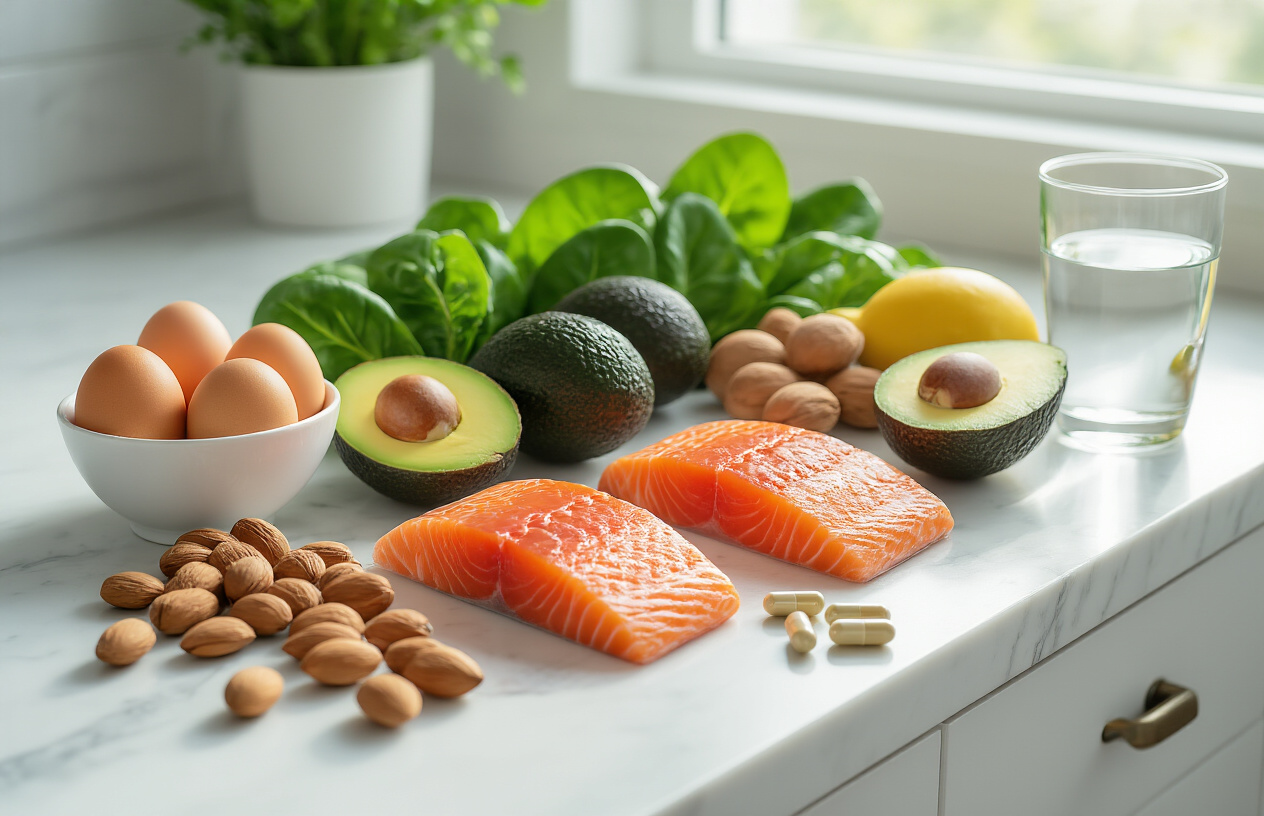
Biotin stands out as one of the most versatile vitamins your body needs to function at its best. From strengthening your hair and nails to supporting your brain and energy levels, this B-vitamin works behind the scenes to keep multiple systems running smoothly. Getting enough biotin through food sources like eggs, nuts, and leafy greens gives you the foundation for good health, while supplements can fill any gaps when needed.
The key to getting the most from biotin is understanding your body’s signals and responding appropriately. If you notice brittle nails, thinning hair, or unexplained fatigue, these might be signs that you need more biotin in your diet. Start by adding biotin-rich foods to your meals, and consider talking to your doctor about supplements if dietary changes aren’t enough. Taking charge of your biotin intake today can lead to noticeable improvements in how you look and feel tomorrow.









